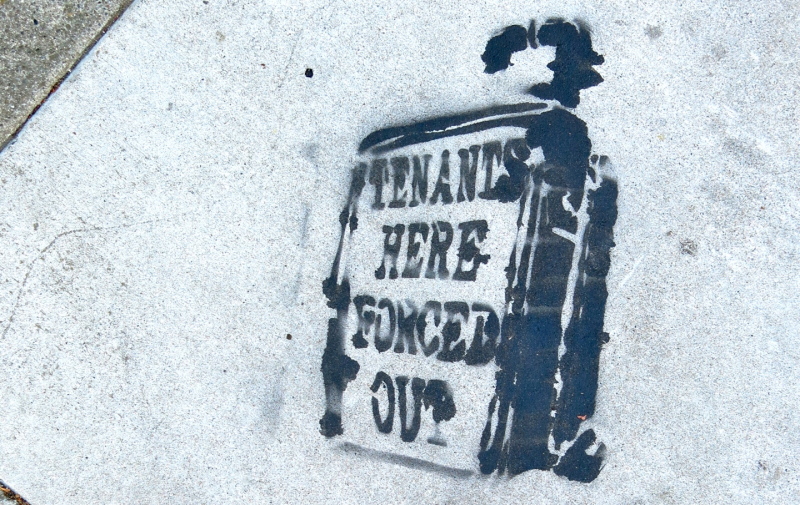Oakland is a just-cause city, which prohibits a landlord from evicting tenants without good or just cause. This ordinance was established under the guiding notion that “Oakland’s prolonged affordable housing crisis disproportionately impacts low-income and working-class households, senior citizens, people of color and people with disabilities,” as stated in Section 8.22.300 of the Oakland Municipal Code. As such, there are only 11 just causes for eviction:
1. Failure to pay rent. If you fail to pay rent that is legally due, the landlord must first issue a written request for you to pay and give you a period of no less than three days to do so. However, if you are withholding rent in compliance with an applicable law, you’re in the clear.
2. Breach of the lease. It is important to note here that any terms in your lease that are contrary to the law are unenforceable and void. So if there’s a clause in your lease that says you must vacate the unit whenever your landlord says so, this is illegal and will not hold up in court.
3. Failure to sign a lease extension that is materially the same as the original lease.
4. Willful and substantial damage beyond normal wear and tear. If this is the case, you still have the right to live there. You will be evicted only if you don’t cease the damage, repair it yourself or pay for repairs after receiving written instructions from your landlord to do so.
5. Disorderly conduct that destroys the peace and quiet of other tenants and continues after written notice to stop.
6. Use of the premises for an illegal purpose, including the manufacture, sale or use of illegal drugs. Recently, sex work was controversially added to this list.
7. Continued denial of landlord access to the premises in accordance with state law, Civil Code Section 1954.
8. The owner wants to repossess the house to live there. This is a tricky one, and there are many clauses that go along with it, including rights to tenants over the age of 60, those with serious illness and longtime residents. If you find yourself in this situation, be sure to read this section carefully.
9. The owner wants to repossess the house for his or her spouse, domestic partner, child, parent or grandparent to live there. Again, this is a tricky one. Read closely!
10. Temporary relocation for three months for substantial repairs. These repairs cannot simply be cosmetic. They must be necessary to bring the property into compliance with codes and laws affecting health and safety, and the owner must have received all permits before a notice to vacate is given.
11. The owner seeks to permanently remove the unit from the housing market. This is also known as an Ellis Act eviction and has its own slew of legalities.
Eviction Process
Being evicted is not as simple as a landlord writing you a letter telling you to leave. According to the California Department of Consumer Affairs, a landlord must file an unlawful detainer lawsuit, which is just a lawsuit he or she must win before eviction is legal. The landlord cannot evict you any other way, but must go through the court system.
This process moves fairly quickly, and is usually complete within 20 days. If you are served with a summons, you have five days (unless you have valid reason for being unable to respond in this time period) to file a written response by the correct legal document (available here) to the court clerk in which the lawsuit was filed. Note that the filing fee here is $180, but you can apply for a fee waiver. Once the proper documents are filed, a court date will be set. If you fail to respond at all, the case automatically goes in favor of the landlord.
At the hearing, both you and your landlord present your evidence and explain your case. Be prepared to be thorough here. Before the hearing, you may request “discovery,” or information/evidence known to your landlord about the case. Gather witnesses, letters, documents, photographs, video or any other evidence to support your case, and have at least five copies of all documents for all hearing parties.
The Outcome
If the judge decides in your favor, you not only don’t have to move, but the landlord may be ordered to pay your filing and attorney fees. Score!
If the landlord wins, you will be issued a writ of possession, which orders you to move out within five days or be forcibly removed by the sheriff, who can also seize your possessions. If the dispute was over unpaid rent or damages to the property, the judge may order you to pay up. And if the court decides that you were malicious in not giving up your unit, you can be fined up to $600 as a penalty, which will show up on your credit report for six years.
There are two ways out of leaving your home even after losing a case. The first is to obtain a relief from forfeiture from the court, which allows you stay in the unit as long as you convince the court that moving would cause severe hardship, that you will pay your owed rent, or that you will fully comply with the lease agreement. You can also appeal the courts decision, and the landlord can, too.
For more information and/or assistance in dealing with any housing issue, contact the following city resources and tenant advocacy organizations: Housing Services and Counseling, Rental Disputes Center, Causa Justa :: Just Cause, Eviction Defense Collaborative, and the East Bay Community Law Center.


